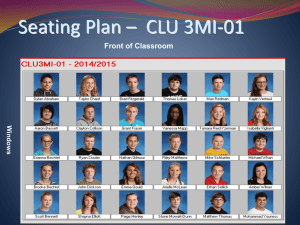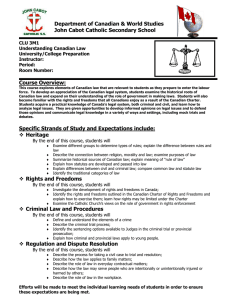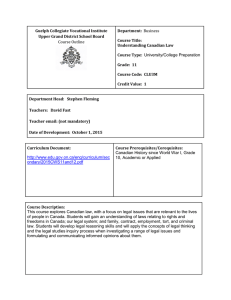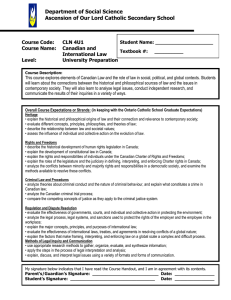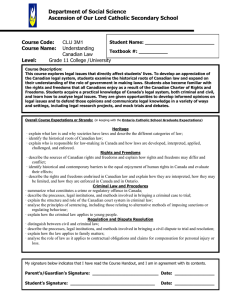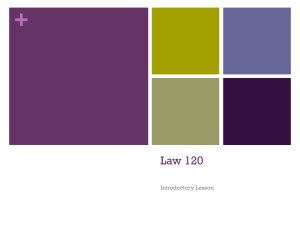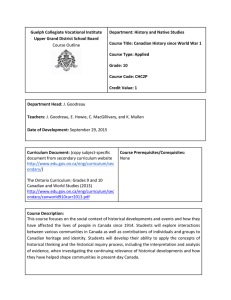Course Outline Guelph Collegiate Vocational Institute Department:
advertisement
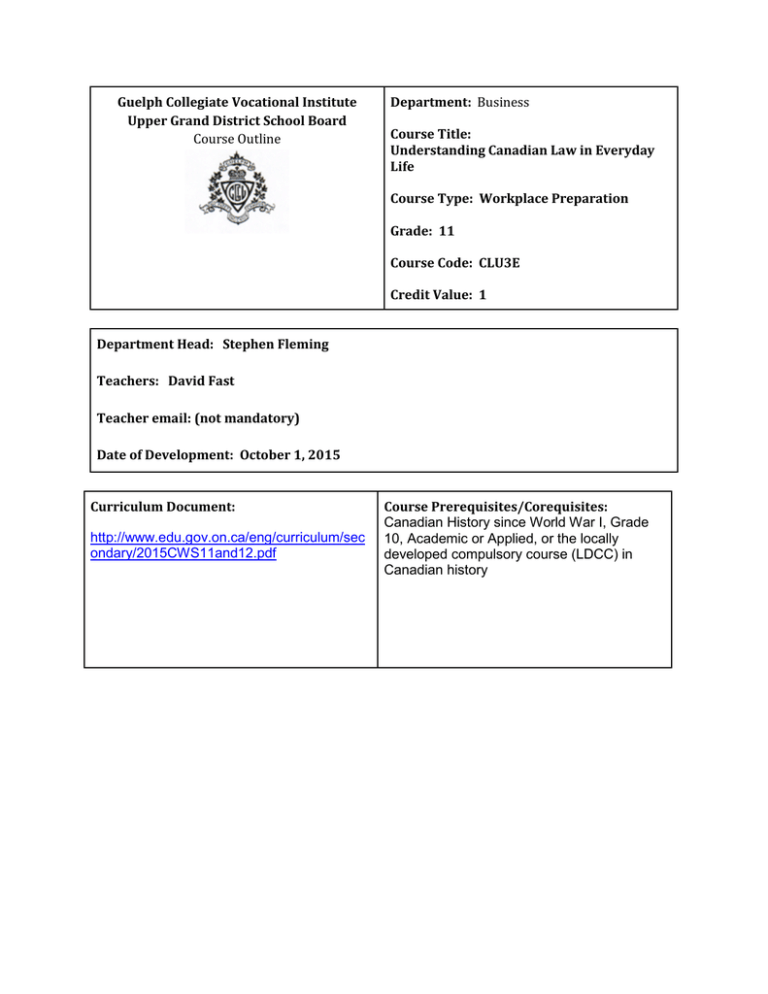
Guelph Collegiate Vocational Institute Upper Grand District School Board Course Outline Department: Business Course Title: Understanding Canadian Law in Everyday Life Course Type: Workplace Preparation Grade: 11 Course Code: CLU3E Credit Value: 1 Department Head: Stephen Fleming Teachers: David Fast Teacher email: (not mandatory) Date of Development: October 1, 2015 Curriculum Document: http://www.edu.gov.on.ca/eng/curriculum/sec ondary/2015CWS11and12.pdf Course Prerequisites/Corequisites: Canadian History since World War I, Grade 10, Academic or Applied, or the locally developed compulsory course (LDCC) in Canadian history Course Description: This course enables students to develop a practical understanding of laws that affect the everyday lives of people in Canada, including their own lives. Students will gain an understanding of the need for laws, and of their rights, freedoms, and responsibilities under Canadian law. Topics include laws relating to marriage, the workplace, cyberbullying, and criminal offences. Students will begin to develop legal reasoning skills and will apply the concepts of legal thinking and the legal studies inquiry process when investigating legal issues that are relevant to life in Canada today. Term Work (70% of the final mark) Unit Title, Big Ideas, and Unit Culminating Tasks Legal Foundations: Law is based on principles derived from society’s beliefs about what is fair and just. Law changes over time in response to a variety of factors, including what society values and believes in, technological advances, and political trends. Rights and Freedoms: The Canadian Charter of Rights and Freedoms reflects Canadian human rights principles. The belief in the protection and promotion of human rights in Canada and the world has developed gradually through the efforts of individuals and groups. Civil Law: Negligence is the most common area of tort law and deals with cases where harm is caused by carelessness rather than the intention to do harm. Family law exists to protect all members in domestic relationships, even when the relationships end. Employment law attempts to balance the rights of business owners and workers. Contract law outlines voluntary legal obligations between two people or two groups. Criminal Law: The punishment of criminals is a distinct part of criminal law. The rules governing the criminal trial process represent an attempt to balance the rights of the accused and the rights of the victim and society. Precedent-setting legal cases, technological advances, and societal trends cause changes in Canadian criminal law and the criminal justice system. Culminating Tasks/Exams (30% or the final mark) Course Culminating Task/Exams and Description News project, Final exam. Based on the range of students’ learning needs, a selection from the strategies listed below may be utilized. Refer to list of teaching and assessment strategies. Teaching Strategies: This course provides differentiated learning for its students by implementing the following teaching and learning strategies: Activity-based Strategies: Oral presentations, panel discussion, and repetition and practice. Direct Instruction Strategies: Cloze, demonstration, guided writing, lecturer, mnemonic devices, practice and drill, prompting, review, visual stimuli, and Socratic dialogue. Independent Learning Strategies: Homework, independent reading, independent study, learning log, memorization, portfolio, reflection, report writing, and response journals. Inquiry and Research Model Strategies: Inquiry process, questioning process, research process, writing process. Learning skills accommodation: Interpersonal intelligence, intra-personal intelligence, logical-mathematical intelligence, verbal-linguistic intelligence, and visual spatial intelligence. Thinking Skills Strategies: Case study, classifying, concepts verification, concept mapping, expressing another point of view, issue-based analysis, lateral thinking, media analysis, meta-cognitive reflection, oral explanation, problem posing, problemsolving, and writing to learn. Assessment and evaluation strategies: Our theory of assessment and evaluation follows the Ministry of Education's Growing Success document, and it is our firm belief that doing so is in the best interests of students. We seek to design assessment in such a way as to make it possible to gather and show evidence of learning in a variety of ways to gradually release responsibility to the students, and to give multiple and varied opportunities to reflect on learning and receive detailed feedback. Growing Success articulates the vision the Ministry has for the purpose and structure of assessment and evaluation techniques. There are seven fundamental principles that ensure best practices and procedures of assessment and evaluation by Virtual High School teachers. VHS assessments and evaluations, are fair, transparent, and equitable for all students; support all students, including those with special education needs, those who are learning the language of instruction (English or French), and those who are First Nation, Métis, or Inuit; are carefully planned to relate to the curriculum expectations and learning goals and, as much as possible, to the interests, learning styles and preferences, needs, and experiences of all students; are communicated clearly to students and parents at the beginning of the course and at other points throughout the school year or course; are ongoing, varied in nature, and administered over a period of time to provide multiple opportunities for students to demonstrate the full range of their learning; provide ongoing descriptive feedback that is clear, specific, meaningful, and timely to support improved learning and achievement; develop students’ self-assessment skills to enable them to assess their own learning, set specific goals, and plan next steps for their learning. Textbooks/Learning Resource Materials (align with Policy 603) Law in Action ISBN: 0-13-040592-2 Fees for Learning Materials/Activities Learning Materials/Activities Field trip to Guelph Criminal Court Cost $0 Please refer to the GCVI Student Handbook for our school policies on: ● academic integrity ● late and missed assignments

